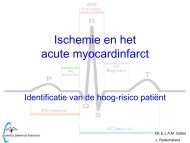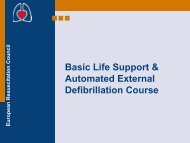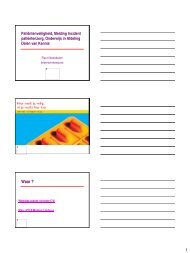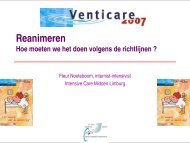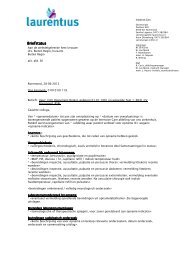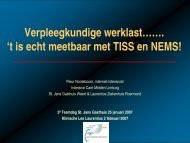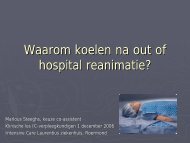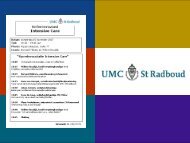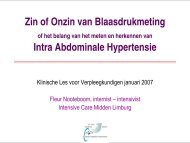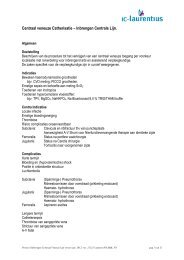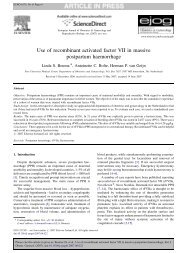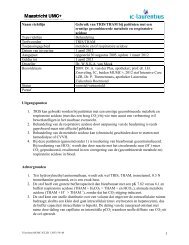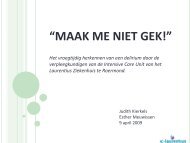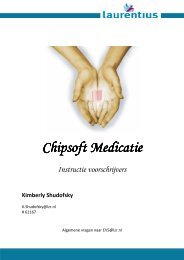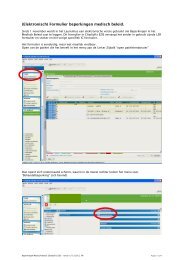Koelen na reanimatie: hoe doe je dat - Dit is het web adres van de ...
Koelen na reanimatie: hoe doe je dat - Dit is het web adres van de ...
Koelen na reanimatie: hoe doe je dat - Dit is het web adres van de ...
Create successful ePaper yourself
Turn your PDF publications into a flip-book with our unique Google optimized e-Paper software.
Hypothermie, <strong>hoe</strong> <strong>doe</strong> <strong>je</strong> <strong>dat</strong> ?<br />
Een prakt<strong>is</strong>che handleiding<br />
Fleur Nooteboom, intern<strong>is</strong>t-intensiv<strong>is</strong>t<br />
Intensive Care Mid<strong>de</strong>n Limburg<br />
St. Jans Gasthu<strong>is</strong>, Weert<br />
Laurentius Ziekenhu<strong>is</strong> Roermond
“Hoe maak <strong>je</strong> ze koud ?”<br />
Fleur Nooteboom, intern<strong>is</strong>t-intensiv<strong>is</strong>t<br />
ICU Mid<strong>de</strong>n Limburg, Roermond en Weert
“uitgangspunten”
Uitkomst Reanimatie<br />
• Out of hospital<br />
zéér somber<br />
• In hospital<br />
somber<br />
• Tot 2002 weinig verbetering in prognose,<br />
ondanks verbetering in techniek, IC.
Vroeger was niet alles beter……..<br />
• Er was eens…………..net als in <strong>de</strong> film
Sprook<strong>je</strong>
Hoop ?<br />
• Voorkomen <strong>is</strong> beter………<br />
• Sectie 4 ERC gui<strong>de</strong>lines zeer lezenswaardig<br />
• (www.erc.edu)<br />
complete gui<strong>de</strong>lines<br />
alleen sectie 4 (adults)
Triage in <strong>het</strong> ziekenhu<strong>is</strong><br />
Tot 40% <strong>van</strong> <strong>de</strong> patiënten met een NTBR<br />
beleid laten ernstige klin<strong>is</strong>che afwijkingen<br />
zijn in <strong>de</strong> 8 uur voorafgaand aan hun<br />
overlij<strong>de</strong>n<br />
Hillman et al Inter<strong>na</strong>l Med J 2001; 31:348-8
Triage in <strong>het</strong> ziekenhu<strong>is</strong><br />
Tot wel 84% <strong>van</strong> <strong>de</strong> resuscitatiepatiënten<br />
hebben ernstige afwijkingen in hun “vital<br />
signs” in <strong>de</strong> 8 uur voorafgaand aan hun<br />
arrest.<br />
Schein et al Chest 1990;98:1388-1392.
Triage in <strong>het</strong> ziekenhu<strong>is</strong><br />
Zeker 50% <strong>van</strong> patiënten die <strong>van</strong> een<br />
verpleegaf<strong>de</strong>ling <strong>na</strong>ar een ICU wor<strong>de</strong>n<br />
overgeplaatste zijn gelei<strong>de</strong>lijk aan<br />
verslechterd<br />
Hillman et al<br />
Intensive Care Med 2002; 28:1629-1634
Pre Intensive Care<br />
TOO LITTLE<br />
TOO LATE
Leven <strong>is</strong> <strong>het</strong> meervoud <strong>van</strong> lef…….<br />
Geoff Lighthall, PhD, MD<br />
Stanford University School of Medicine<br />
Stanford, California
Probleema<strong>na</strong>lyse<br />
Verplgkundige<br />
- Reg<strong>is</strong>treert, mag niet<br />
zelfstandig han<strong>de</strong>len<br />
Arts-ass<strong>is</strong>tent<br />
– Reageert, maar<br />
onervaren<br />
Special<strong>is</strong>t<br />
– zel<strong>de</strong>n Acute<br />
Geneeskun<strong>de</strong><br />
1/0033
Probleema<strong>na</strong>lyse 2<br />
• Waarom vaak suboptimale zorg op af<strong>de</strong>lingen:<br />
• Wrong people<br />
• Too late<br />
• No organ<strong>is</strong>ation<br />
McQuillan et al BMJ 1998;316:1853<br />
• Delay in diagnos<strong>is</strong><br />
• Delay in response<br />
• Lack of knowledge<br />
• Lack of expert<strong>is</strong>e
Hoop !!<br />
• Voorkomen <strong>is</strong> beter………<br />
• <strong>Koelen</strong> !
Februari 2002
Treatment of Comatose Survivors of Out-of-<br />
Hospital Cardiac Arrest with Induced Hypothermia<br />
Stephen A. Ber<strong>na</strong>rd, M.B., B.S., Timothy W. Gray, M.B., B.S., Michael D. Bu<strong>is</strong>t, M.B.,<br />
B.S., Bruce M. Jones, M.B., B.S., William Silvester, M.B., B.S., Geoff Gutteridge, M.B.,<br />
B.S. and Karen Smith, B.Sc.<br />
N Engl J Med<br />
Volume 346;8:557-563<br />
February 21, 2002
• Patients who remain unconscious after resuscitation from<br />
cardiac arrest outsi<strong>de</strong> the hospital have a poor prognos<strong>is</strong><br />
• In th<strong>is</strong> trial, 77 patients were assigned to treatment with<br />
mo<strong>de</strong>rate induced hypothermia or normothermia<br />
• Survival to hospital d<strong>is</strong>charge with good neurologic recovery<br />
was more frequent in the hypothermia group than in the<br />
normothermia group<br />
• Th<strong>is</strong> study on its own would be regar<strong>de</strong>d as prelimi<strong>na</strong>ry,<br />
because it inclu<strong>de</strong>d only a small number of patients and had<br />
other important limitations<br />
• However, when consi<strong>de</strong>red in conjunction with the<br />
Hypothermia after Cardiac Arrest Study reported in th<strong>is</strong><br />
<strong>is</strong>sue of the Jour<strong>na</strong>l, it indicates that mo<strong>de</strong>rate hypothermia<br />
may improve outcome in th<strong>is</strong> otherw<strong>is</strong>e ominous condition
Clinical Character<strong>is</strong>tics of the 77 Patients with Anoxic Brain Injury Who Were Eligible for<br />
Randomization<br />
Ber<strong>na</strong>rd, S. et al. N Engl J Med 2002;346:557-563
Ber<strong>na</strong>rd, S. et al. N Engl J Med 2002;346:557-563<br />
Biochemical Values
er<strong>na</strong>rd, S. A. et al. N Engl J Med 2002;346:557-563<br />
Outcome of Patients at D<strong>is</strong>charge from the Hospital.
Mild Therapeutic Hypothermia to Improve the<br />
Neurologic Outcome after Cardiac Arrest<br />
The Hypothermia after Cardiac Arrest Study Group<br />
N Engl J Med<br />
Volume 346;8:549-556<br />
February 21, 2002
Study Overview<br />
• Cerebral injury and associated cognitive dysfunction are<br />
common after sustained cardiac arrest<br />
• In th<strong>is</strong> study, mild therapeutic hypothermia was compared<br />
with normothermia in patients who had been resuscitated<br />
after cardiac arrest due to ventricular fibrillation<br />
• A favorable neurologic outcome was significantly more<br />
frequent in the group treated with hypothermia<br />
• These results, in conjunction with those of another study in<br />
th<strong>is</strong> <strong>is</strong>sue, suggest that mild therapeutic hypothermia may<br />
have a substantial benefit in patients who have been<br />
resuscitated after cardiac arrest and that th<strong>is</strong> approach<br />
should now be consi<strong>de</strong>red in the care of such patients
he Hypothermia after Cardiac Arrest Study Group, . N<br />
ngl J Med 2002;346:549-556<br />
Base-Line Character<strong>is</strong>tics of the Patients
Blad<strong>de</strong>r Temperature in the Normothermia and Hypothermia Groups<br />
he Hypothermia after Cardiac Arrest Study Group, . N<br />
ngl J Med 2002;346:549-556
Neurologic Outcome and Mortality at Six Months<br />
The Hypothermia after Cardiac Arrest Study Group, . N<br />
Engl J Med 2002;346:549-556
Cumulative Survival in the Normothermia and Hypothermia Groups<br />
he Hypothermia after Cardiac Arrest Study Group, . N<br />
ngl J Med 2002;346:549-556
Deaths before D<strong>is</strong>charge and Deaths after D<strong>is</strong>charge According to the Cerebral-Performance<br />
Category<br />
The Hypothermia after Cardiac Arrest Study Group, . N<br />
Engl J Med 2002;346:549-556
Complications during the First Seven Days after Cardiac Arrest<br />
he Hypothermia after Cardiac Arrest Study Group, . N<br />
ngl J Med 2002;346:549-556
Conclusions<br />
• Conclusions In patients who have been successfully resuscitated after<br />
cardiac arrest due to ventricular fibrillation, therapeutic mild hypothermia<br />
increased the rate of a favorable neurologic outcome and reduced<br />
mortality
Wie koelen<br />
• VF zeker<br />
• Alle cardiac arrests, ongeacht oorzaak<br />
• Encephalopathie, hyp- of anox<strong>is</strong>ch
Hoe koelen ?<br />
• Snel<br />
• Controleerbaar<br />
• Geen complicaties<br />
• Geduren<strong>de</strong> ???<br />
2 – 4 uur ROSC<br />
Closed loop<br />
12 – 24 uur<br />
• Cave routines !!!
Voorzorgen<br />
• Tekenen <strong>van</strong> hypox<strong>is</strong>che encephalopathie<br />
– EMV < 8<br />
• Se<strong>dat</strong>ie, eventueel verslappen<br />
• Intensieve <strong>de</strong>cubitus preventie<br />
• Géén actieve bevochtiger: “regen”
Voorzorgen<br />
• Steriel werken<br />
– Infectiepreventie<br />
– Barrière verpleging<br />
• Strikte bewaking temperatuur: trend !<br />
• Controle stolling, glucose
Non Invasief<br />
• Infusie glucose 5 % 30 ml / kg in 2 uur 4° C<br />
– Δ temp 1,5 – 2 ° C<br />
• Cold packs in oksels, liezen, nek / hoofd<br />
– Gaat hard……<br />
• Core temperature meten<br />
– = blaas, oesophagus, rectum
Na 24 uur…<br />
• Gelei<strong>de</strong>lijk opwarmen.<br />
• Voorkom koorts<br />
– Daarom gelei<strong>de</strong>lijk min<strong>de</strong>r koelen als<br />
opwarmmetho<strong>de</strong><br />
• Houdt temperatuur < 38 ° C
Gadgets<br />
Non invasief<br />
Cincin<strong>na</strong>ti Sub Zero<br />
Watersysteem: <strong>de</strong>kens / vest<br />
High flow pomp; feed back
Cincin<strong>na</strong>ti Sub Zero<br />
• Non Invasief<br />
• Multi Purpose (rewarming; heat stroke; maligne<br />
neuroleptica syndroom)<br />
• Re usable<br />
• Automaat (closed loop systeem) koelt vest en <strong>de</strong>kens<br />
erg af: vasoconstrictie huid !! (Blanket Roll iii = goed)<br />
• Tussen 2 – 4 uur uur op 33 °C
Gadgets<br />
Non invasief<br />
Cair Cooler: Actamed / Pentatherm<br />
Luchtsysteem: kou<strong>de</strong> variant Bair Hugger<br />
Lucht 10 C; geen <strong>dat</strong>a
Gadgets<br />
Invasief
Inner cool cat<strong>het</strong>her<br />
• Razend snel anesthesie ++<br />
• Goed stuurbaar<br />
• Invasief<br />
• Single Use<br />
• Kostbaar
Key Points<br />
• Voorkomen <strong>is</strong> beter<br />
• <strong>Koelen</strong> waarschijnlijk zinvol<br />
– Meer studies nodig<br />
• Overal toepasbaar<br />
• “Gadgets” niet per se noodzakelijk.
החייאה<br />
Met veel dank voor film ב קולנו ע<br />
Yoel Donchin M.D.<br />
Michael Beigel Ph.D.<br />
The Hebrew University and<br />
Hadassah Medical School<br />
Jerusalem, Israel
Vragen



